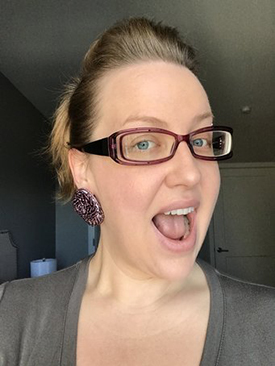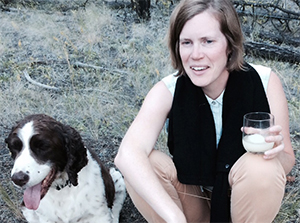The Process of Decolonization: Kate Kennedy in Conversation with Jenny Ferguson

Jenny Ferguson, whose creative nonfiction piece "Excavating Rias: the Balkans 1995, the Balkans 2016" appears in the Malahat's Autumn 2018 issue, discusses travelling in the former Yugoslavia, radical honesty, and waiting for the right time to write an essay in her Q&A with Malahat volunteer Kate Kennedy.
Jenny Ferguson is Métis, an activist, a feminist, an auntie, and an accomplice armed with a PhD. She believes writing and teaching are political acts. Her first book, Border Markers, a collection of interrelated flash fiction stories, is out now with NeWest Press. Learn more about her other novels, short stories, essays, and poems. Her Have Book Will Travel listing is here, in case you want to book her for an event. She's also the CNF editor for carte blanche. Her teaching, critical publications, and c.v. are also showcased here. She lives on Osage territory and teaches at Missouri Southern State University. She also teaches at the University of British Columbia through their Optional Residency MFA program. You can reach her on twitter where she tweets at @jennyleeSD or through her contact page.
First I wanted to tell you how delighted I was by “Excavating Rias.” Based on the title and opening sentences I have to admit I initially anticipated something more in the way of a dutiful daughter sharing her dad’s experience of war, definitely something more sentimental, definitely not funny. And on one level it’s the story of a failure to write exactly that kind of essay, but the result is significantly more interesting. Can you tell me a little about planning the trip and coming to write the essay that eventually resulted?
The trip surprised me, in that, I’m an avid traveller, but I’d never really thought about going to the former Yugoslavia. But my BFF, Holly Baker, who is a writer herself, was abroad for a year in Romania with the Fulbright Program, researching for her novel about the adoption of Romanian orphans to the U.S.
I’m not one to give up what feels like once-in-a-lifetime opportunities. And I didn’t know when I’d ever be able to live for two weeks in a painted-in-all-the-blues-sometimes-totally-clashing-blues communist block apartment ever again.
Holly and I wanted to plan a trip to take her “home” the slow way even though we were carrying everything she owned or had acquired over the course of twelve months. When Holly mentioned Montenegro as a place she wanted to visit, from there, our trip unfolded to include time in Dubrovnik because I had just finished a PhD program (hi, depression! hi, feelings of inadequacy! hi, academic job market hell!) and an awful year of all the terrible things that have to happen before you can get a loved one with mental illness in Canada help, and the idea of sitting on the beach quietly appealed to me. Also, Dubrovnik had history and culture too, for less lazy days.
Sarajevo, though, came out of nowhere. We were looking for the cheapest flights home—Holly to the U.S. and me to Halifax—and Dubrovnik was out of our price range. We considered Zagreb, further north, but from the southernmost tip of Croatia we were actually closer to Sarajevo in Bosnia and Herzegovina—and strangely, the bus ticket to Sarajevo was inexpensive and the price was right for both of our flights. And, so, Sarajevo became our last stop.
This essay unfolded entirely unexpectedly from the trip. When I planned the trip I didn’t write CNF. And I’ve never considered writing a novel about the former Yugoslavia.
When I planned the trip, I was running away from my family.
But, of course, when we run away, we tend to find exactly what we were running from.
There’s a very satisfying compactness of past in present just in the syntax of your sentences. Like: “The first part of my trip in the region that used to be called Yugoslavia, but twenty-some-years later is a handful of separate nations, begins in Montenegro.” Also: “Before the trip to Romania and the Balkans, between graduating and committing my mother to a locked-ward, I read a few things about driving in Montenegro and sort of laugh them off.” I found this created an irreverence that also quickly gets out of its own way. Is this style, at the sentence level, emerging in the editing stages for you or is it steering the direction of the narrative during the writing process? Both?
Historically, I write the most complicated syntactical sentences naturally and forget that simplicity has its own merits too. So this comes out in drafting process.
But this piece also required a tightness to bring a distant past and a recent past together, and as you’ve noted above, avoid sentimentality. Travel writing, for me, must avoid the sentimental and the consumption of things and cultures and people that the writer declares “other.” That’s hard to do in this genre, and especially hard when I was on the ground doing exactly that: consuming and wanting to consume for my own purposes. But CNF also invites reflection on events, and especially, in personal and lyric essays, on the self.
Sometimes, those sentences are where you can see the crochet hook’s work, where I’ve looped together two times, two versions of past-me, efficiently, but also with a present-me voice that acts not to create a memory that’s totally fixed in time and without critical self reflection.
Toward the end of “Excavating Rias” you mention the time that has passed between the experience of visiting the Balkans and being ready to write this essay about it. I was hoping you might say a little, more broadly, about when you decide you’re ready to begin a new nonfiction piece. Are there generally discarded attempts in the wake of a finished essay or is it more a sense of biding your time until the right approach presents itself?
This essay was part of a long process I’d been going through personally—that is, my decolonization—and also, I’ve learned with writing, in general, I need to wait for the right time. Pushing writing doesn’t result in good writing for me. It might for others. I’m a Taurus and we like to be grounded, we like to take our time.
This essay, on the surface, doesn’t seem to speak directly to decolonization. And I didn’t realize it would when I started writing it. But I had to be far enough along in that process myself to write this essay, and to come to the stark conclusions about my own behaviour that arose in the Balkans.
I’ve always been irrationally proud of the work my dad did. And proud of the fact I was Canadian. But that pride—it was entirely coming from a colonial mind. That pride is why I didn’t have a corresponding pride in being Métis as a child and all through to my very late twenties.
This essay couldn’t have been written before I’d come to understand certain things in a decolonial mind-frame. Or, it could have. But it would have been a very different essay.
At the risk of naming authors you possibly don’t identify with at all, I would place your work alongside that of Maggie Nelson and Sarah Manguso, both writers of nonfiction in the vein of “where I’m at,” “this is what I know so far.” I find this a very exciting shelf of nonfiction both for its sincerity and for what seems to me a quite unapologetic presentation of personal truth that embraces the unknowns. Are you conscious of being part of that and, further, do you have particular subjects you see yourself returning to as you continue to write nonfiction among the other genres you work in?
I believe in radical honesty, and so I need to tell you that I’m crying. Because wow, oh my stars, Maggie Nelson and Sarah Manguso. Thank you! And, for good measure, one more wow!
CNF is where all the complicated parts of me are happy, and it’s nice to hear that what you see in this essay is honest and presented without too many pretenses. In my essays, I’m trying to be as close to my authentic self as I can. Sometimes, in writing, that’s easier than in person.
Right now, the project I’m working on is focused on my decolonization. I’m trying to be radically honest when I look at myself, and that means subject-wise I jump around. I just finished a flash essay on sharks and empathy. I’m interested in bodies, particularly fat bodies, particularly my fat body plus ballet. I have an essay I know I have to write one day on why I’m sober—but I’m not yet ready to face that one.
I’m less interested in subjects at this point, and more interested in exploring a process. And the process of decolonization, it touches everything. I’m mostly trying to follow the path where it goes, even when it hurts or reveals something I’d rather not see, those very ugly parts of what it is to be human.
According to my sleuthing you’re the creative nonfiction editor at carte blanche and have also taught creative nonfiction. Who are some authors, whether up and coming or established, working in the genre, that you’d recommend?
Hi, yes, this is my favourite question to be asked. I’m going to share some names you need to get to know, if not today, sometime this week. Bookmark these links now, revisit them when you have time to digest.
First off, Marcos Gonsalez, is an absolutely breathtaking essayist to read. He moves between race, and gaming, and HIV, and the experience of being a gay, as he says, MexiRican, in sentences that make my teeth ache with sweet and always force me to think and feel—deeply. You can start here, with this essay (published in carte blanche), and also read this one, my favourite.
If you don’t know Alicia Elliott yet, please rectify this. She’s an incredible, needed Indigenous essayist who I value as an artist and human. She calls herself a “National Magazine Award-Winning Messy bitch” in her Twitter bio. I adore her! I’m going to immediately send you to pre-order her collection of essays, A Mind Spread Out On The Ground. But to get her words in your hands immediately, this essay on space and Colten Boushie broke me and healed me a little too.
You’re going to be hearing Isabella Wang’s name a lot—soon. She was The New Quarterly’s youngest published writer ever, with her essay “Shortcomings of a Juvenile,” and carte blanche will have another essay of hers up soon. Plus, she’s told me about a multi-generation lyric essay she’s working on, and I cannot wait to read it when she’s ready. Follow her on Twitter and be ready to be wowed.
I can go on and on. Katherine Crocker, scientist and essayist, and all around wonderful human! Gwen Benaway, poet and essayist and literal supernova! Please, find me and ask me to keep talking, and I will. There is so much literary goodness coming your way in CNF. This is just a taste.

Kate Kennedy
* * * * * * * *









